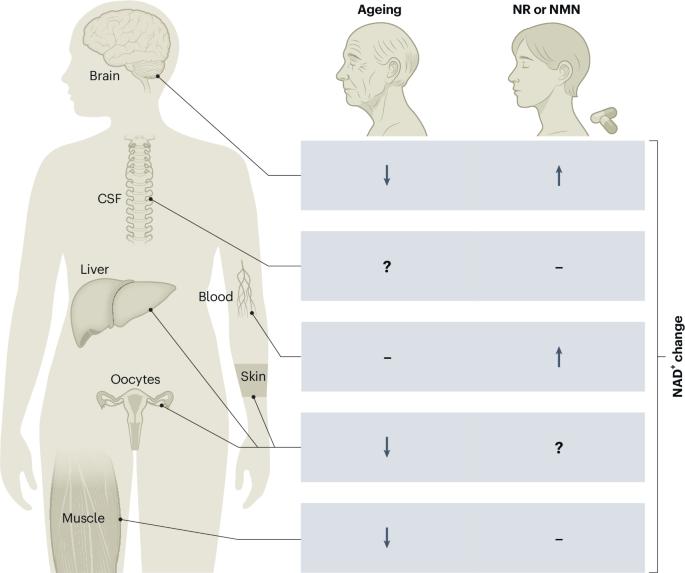NAD+ precursor supplementation in human ageing: clinical evidence and challenges
IF 20.8
1区 医学
Q1 ENDOCRINOLOGY & METABOLISM
引用次数: 0
Abstract
Nicotinamide adenine dinucleotide (NAD+) is an essential molecule involved in cellular metabolism, and its decline has been implicated in ageing and age-related disorders. However, evidence for an age-related decline in NAD+ levels in humans has been consistently observed only in a limited number of studies. Similarly, although preclinical studies support the idea that supplementation with NAD+ precursors is a promising therapeutic strategy to promote healthy ageing, human clinical trials have shown limited efficacy. Therefore, an increasing understanding of how NAD+ metabolism is affected in different tissues during disease and following NAD+ precursor supplementation is crucial to defining the therapeutic value of NAD+-targeted therapies. In this Review, we evaluate the clinical evidence supporting the notion that NAD+ levels decline with age, as well as the tissue-specific effects of NAD+ precursor supplementation. Viewed in perspective, the published body of data on NAD+ dynamics in human tissues remains sparse, and the extrapolation of rodent-based data is not straightforward, underscoring the need for more clinical studies to gain deeper insights into systemic and tissue-specific NAD+ metabolism. This Review summarizes existing data, as well as crucial knowledge gaps, emerging from clinical trials involving NAD+ precursor supplementation in humans.

补充NAD+前体在人类衰老中的作用:临床证据和挑战。
烟酰胺腺嘌呤二核苷酸(NAD+)是参与细胞代谢的重要分子,其下降与衰老和年龄相关疾病有关。然而,只有在有限的研究中才一直观察到人类NAD+水平与年龄相关的下降的证据。同样,尽管临床前研究支持补充NAD+前体是一种有希望的促进健康衰老的治疗策略,但人体临床试验显示效果有限。因此,越来越多地了解疾病期间和补充NAD+前体后不同组织中NAD+代谢如何受到影响,对于确定NAD+靶向治疗的治疗价值至关重要。在这篇综述中,我们评估了支持NAD+水平随年龄下降这一观点的临床证据,以及补充NAD+前体的组织特异性作用。从这个角度来看,关于人体组织中NAD+动力学的已发表数据仍然很少,并且基于啮齿动物的数据的外推并不简单,强调需要更多的临床研究来更深入地了解系统和组织特异性NAD+代谢。
本文章由计算机程序翻译,如有差异,请以英文原文为准。
求助全文
约1分钟内获得全文
求助全文
来源期刊

Nature metabolism
ENDOCRINOLOGY & METABOLISM-
CiteScore
27.50
自引率
2.40%
发文量
170
期刊介绍:
Nature Metabolism is a peer-reviewed scientific journal that covers a broad range of topics in metabolism research. It aims to advance the understanding of metabolic and homeostatic processes at a cellular and physiological level. The journal publishes research from various fields, including fundamental cell biology, basic biomedical and translational research, and integrative physiology. It focuses on how cellular metabolism affects cellular function, the physiology and homeostasis of organs and tissues, and the regulation of organismal energy homeostasis. It also investigates the molecular pathophysiology of metabolic diseases such as diabetes and obesity, as well as their treatment. Nature Metabolism follows the standards of other Nature-branded journals, with a dedicated team of professional editors, rigorous peer-review process, high standards of copy-editing and production, swift publication, and editorial independence. The journal has a high impact factor, has a certain influence in the international area, and is deeply concerned and cited by the majority of scholars.
 求助内容:
求助内容: 应助结果提醒方式:
应助结果提醒方式:


